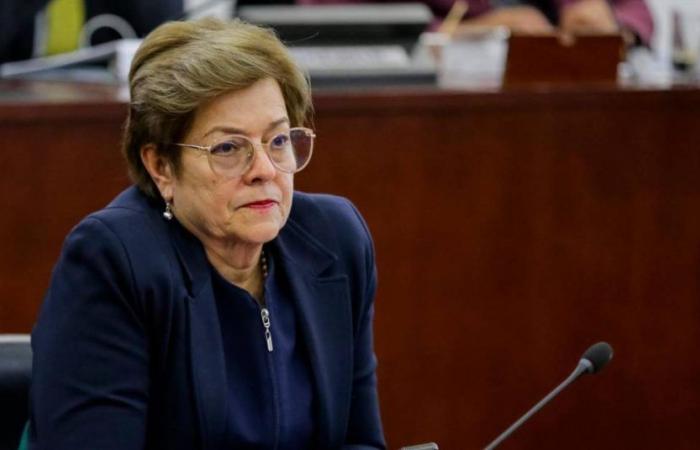12:01 AM
If one thing is clear, it is that more than one businessman, worker and union member are paying attention to what is happening with the labor reform. It must be recognized that this is a bill that seeks structural changes that, without a doubt, will impact the labor market in the country.
The point is that this transformation generates a great fundamental fracture that will be difficult for productive unions to resolve, which predict an increase in informality if it is approved; and the defenders of the project, who claim the recovery of dignity for the worker.
And the Government seems determined to get the green light for its reforms. In fact, he recently approved the pension through a proposal, which many already considered sunk given the short time left in the legislature. Then, on June 18, he won another small victory with approval in the first debate.
The truth is that the labor bill has received questions from businessmen and analysts, who have warned of a negative impact on the Colombian labor market, which has made it difficult to pass through the legislature.
In March of last year, the filing of the draft of said document in Congress was known. In a symbolic act in the Plaza de Armas of the Casa de Nariño, President Gustavo Petro maintained that the initiative would “empower working people”; Three months later he ended up sunk in the legislative chamber.
However, the Government re-presented the project, but it did not have an easy time; it was necessary to make several changes to consolidate majorities in the Seventh Chamber Commission. It’s no secret that this one is different from the original.
In fact, the Minister of Labor herself, Gloria Inés Ramírez, acknowledged that the presentation included 94 articles, of which 36 were approved without changes, 39 points had a proposal or modification and 23 were eliminated, but, in addition, six new ones were included that They were approved.
Some critics claim that the reform was lame, since the majority of the deleted articles were due to its union wing, since they were part of a package of points on collective rights and the defense of the strike, which did not sit well with the organizations. unions sympathetic to the Government. Fabio Arias, president of the Unitary Central of Workers, commented that the reform must be the sum of the recovery of individual rights, such as night and Sunday surcharges; and collective rights, which refer to association, negotiation and strike for employees.
Although he indicated that they will continue to accompany the reform, he was categorical that they are international commitments from previous governments and that businessmen supported. “For us they are essential and recovering them will be our main emphasis,” he said.
In this regard, María Fernanda Carrascal, representative speaker, responded to EL COLOMBIANO that no bill leaves the debate as it enters. He added that they undergo transformations, improvements and in some cases they are damaged. “It is a consequence of dialogue, negotiations, agreements and mainly of the correlation of political forces within Congress,” he said.
He added that the government bench has defended the heart of the reform, which lies in job stability, gender equality, the elimination of violence in the workplace, and the recovery of collective rights.
A better reform?
Analysts consulted by this newspaper think very differently and agreed that the labor reform that came out of the Seventh Commission is better than the one that came in, but they continue to consider it a threat to the labor market.
For example, José Manuel Restrepo, rector of the EIA University and former Minister of Finance, argued that the reform insists on increasing employment costs, making the entry and exit of workers from companies more flexible, and focusing the hiring model indefinite term, but what the world is looking for is to be more flexible in terms of hiring.
The academic refers to article six. This indicates that the fixed-term employment contract may be concluded for 4 years (previously it was 3 years); If this period is exceeded, it will be understood that it is an indefinite-term contract.
Furthermore, the indefinite-term contract is established as the main one to establish labor relations; However, permanent contracts or service provision contracts are not eliminated.
In addition, union contracts were prohibited. The speakers of the project stated that these weaken the exercise of the union association, since they are being used as a strategy of illegal labor intermediation, affecting workers in the health sector, where more than 97% of said contractual modality are found, according to figures from the Ministry from work.
The recovery of night and Sunday shifts cannot be left aside. The presentation maintains that the night surcharge will be paid starting at 7:00 pm. That means that it will be recognized two hours in advance, since currently it is paid starting at 9:00 pm.
Regarding the progressive recovery of Sunday and holiday hours, this will be 100% voluntary, however, starting in July 2026 it would be mandatory.
Regarding the criticism that some of these measures generate a higher cost, the Government responds that these are some unions that maintain that the reform will have consequences.
“The truth is that reducing business costs to generate employment does not work. This statement has no theoretical or empirical support. In fact, Law 789 of 2002, which reduced labor costs and made formal employment precarious, was supposedly introduced to create 600,000 jobs; However, studies showed that it did not generate employment, some even suggest that it destroyed jobs,” Carrascal said.
But it is not only the unions that question the reform. The Labor Observatory of the Javeriana University points out that the presentation preserves a basic problem: it does not solve the problem of informality, on the contrary, they insist, it raises it.
Carlos Adolfo Prieto, researcher at the observatory, commented that this reform remains in a model of dependent employment relationship that was defended by the model of the Second Industrial Revolution (early 20th century). The problem is that today we talk about the fourth revolution, which brings different and more flexible work dynamics, which is why it is considered that the reform should be comprehensive with the Substantive Labor Code and update it, since it has not been touched for 74 years.
Higher costs
The thesis of the unions and analysts is simple: A micro, small or medium-sized company will not take a step towards formality if it has to assume higher costs for its personnel.
There is an alert about some specific sectors (such as restaurants and hotels) following the restoration of the night shift and the return of Sunday hours, since these businesses operate with a much more flexible staff, such as restaurants, who sometimes hire workers for only a few hours at night.
Guillermo Henrique Gómez, president of the Colombian Association of Gastronomic Industry (Acodres), applauds that the Seventh Commission took into account several of the observations they expressed, but, in his opinion, the reform is unnecessary and considers it a threat to business sustainability .
The union leader said that the sector has about 110,000 restaurants in the country, of which 70,000 are informal. And it is estimated that it has 420,000 direct workers. The informal ones can reach close to 1 million.
The sector’s concern is due to the fact that informality figures are growing, since according to Acodres records, in 2023 it closed with a contraction in sales of 27% and so far in 2024 they have invoiced 24% less compared to the same months of the year past.
Gómez’s argument is due to the fact that the reform can carry out many of its initiatives through the Labor Statute, since it provides tools to protect the rights of workers. He stated that the union would support a project aimed at improving productivity.
The underlying issue is that the unions feel that the Government does not understand that close to 95% of the business fabric in Colombia is made up of microbusinesses, which is why they consider that it is legislating only for large businessmen.
Diagnosis of the agricultural sector
The Government celebrated the approval of articles 34 and 35 that speak of agricultural wages, which establish that they cannot be less than a minimum wage, and create an agricultural contract for said sector.
The reality is that the diagnosis from the agricultural sector is not very far from the rest of the unions that view the reform with distrust. The Farmers Society said that informality in the countryside amounts to 84%. One of the factors that affects this figure is due to the absence of an adequate labor regime for the countryside, where many of the jobs are seasonal and flexible, that is, a worker can perform several tasks on different farms in a single day.
Jorge Bedoya, president of the SAC, said that for this reason they proposed a regime that would correct the situation. And he said that this Government was the first to be interested and took the proposal, but it discarded many of the critical aspects that the union included, for example, articles 34 and 35 did not contemplate that in the field one could hire for the time actually worked. .
By contrast, A point was added that worries the union. This is article 38, which talks about paid community family work. “It says that if there is a subordinate job that is done for more than 15 hours a week, the rules of the labor or agricultural contract will apply; it is not known if those hours are continuous or discontinuous. So we believe that the remedy may be worse than the disease.”
The point is that, apparently, it will not be easy for the Government to carry out this project without continuing to achieve consensus with both the opposition and with unions and businessmen. This is because, as mentioned above, the concern of the productive sector prevails and they even describe labor concerns as unnecessary. Carlo Prieto, an analyst at the Labor Observatory, contributed some words about the situation: “We have to be able as a society to open spaces for dialogue and agreement. I am in favor of the fact that if this reform has already passed the first debate, space will be opened and new ideas will be heard. voices to build something better.”






